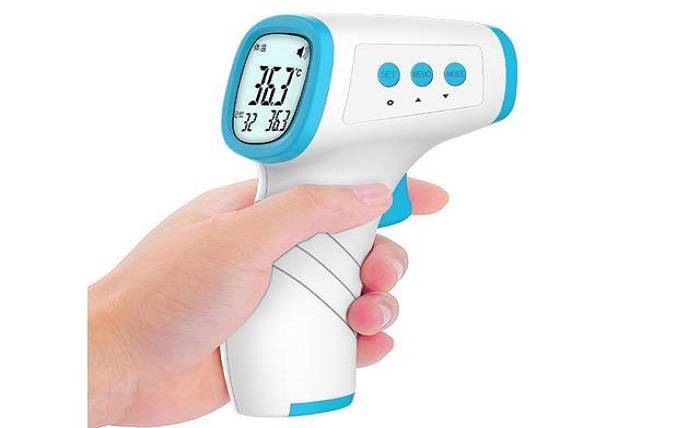
Shopping for the right type of infrared thermometer can be challenging if you don’t know what to look for. However, with the tips and information in this article, you should have no trouble making an informed choice for your business.
What are infrared thermometers, and what are they used for?
As you might guess, infrared thermometers are a type of thermometer that measures infrared radiation emitted from an object. Unlike traditional thermometers, there’s no need to make contact with a surface to take its temperature.
Infrared thermometers are common in industries and applications like meteorology, medicine, and home improvement. For example, doctors and nurses may use infrared thermometers to take a patient’s temperature without touching them. In this way, they’re a safer and more sanitary way to measure body temperature.
Tip #1: Consider your budget
The first step to choosing the right kind of infrared thermometer for your business is to consider your budget. Like most digital devices, costs can range from low-priced budget options to more expensive, high-end varieties.
As a general guide, infrared thermometer prices range from $90 for a simple medical-grade detector to $3,500 for a heavy-duty, intrinsically safe IR thermometer (designed for use in hazardous environments).
To make the right choice, you’ll need to balance your budget against your needs. If you’re only measuring body temperature, a cheaper option with a small temperature range should be suitable. However, you can expect to pay much more for broader temperature ranges and enhanced features.
Tip #2: Select the right style
The next step is to consider the style of infrared thermometer that will work best for your needs. The handheld ‘gun’ style is the most popular, especially for medical applications, although other varieties are available.
For example, an IR thermometer with a built-in probe is a smart choice if you work in the food industry. These styles allow for non-contact measurement, which is ideal for environmental testing, along with probe-testing, which is perfect for food and beverage safety management.
Tip #3: Look at accuracy and minimum/maximum temperature
Infrared thermometers typically have a measurement error specification, reflecting their highest accuracy. Accuracy ratings can range from +-0.1°C to +-2°C. The more accurate a thermometer is, the more expensive it’s likely to be, so you’ll need to weigh your accuracy needs against your budget.
Temperature scale and minimum/maximum measurement ratings are also important. Almost all IR thermometers will feature a Centigrade scale in Australia, and some also offer a Fahrenheit measurement option.
Maximum temperatures can range from 60°C to 2,000°C and above, while minimum temperatures can range from -35°C to -150°C and below. The narrowest minimum and maximum range options should suffice if you’re measuring body or food temperature. However, broader temperature ranges may be necessary in industrial and heavy-duty settings,
It’s time to find the right infrared thermometer for your needs
By following these tips, you can determine the type of infrared thermometer that will best suit your business’s needs. Now, you can get out there and start shopping with confidence!
Looking for high-quality infrared thermometers? Visit RS Online, and shop the range!




